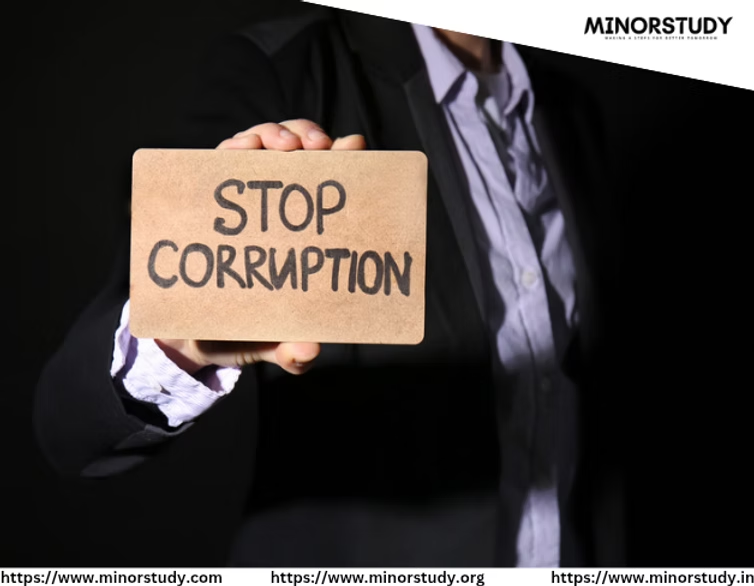🔍 Introduction: A Day That Demands Integrity
International Anti-Corruption Day: Corruption is one of the most serious threats to the foundations of justice, equality, and democracy. It silently drains public resources, destroys opportunities, deepens poverty, and fosters distrust in institutions. International Anti-Corruption Day, observed every year on December 9, is a global call to action to eliminate corruption from every sector of society — from local offices to international corporations.
- 🗓️ Timeline and History of International Anti-Corruption Day
- 📘 Historical Context
- 🌍 Significance of International Anti-Corruption Day
- 🔒 1. Promoting Transparency
- 🛑 2. Fighting Injustice
- 💡 3. Empowering Citizens
- 🧭 4. Building Strong Institutions
- 🧒 5. Shaping Future Generations
- 🧠 7 Facts About Corruption and Anti-Corruption Efforts
- 🌐 Global Observance: How Countries Mark the Day
- 💬 Wishing Messages and Quotes
- ❓ Frequently Asked Questions (FAQs)
- 💡 Importance in Our Daily Lives
- 📌 6 Important Points to Remember
- 🧭 Moral and Societal Impact
- ✅ Conclusion: From Awareness to Action
This day isn’t just about legislation or punishment; it’s about raising awareness, inspiring reform, and encouraging individual responsibility. Let’s explore how this powerful observance came to be, its impact on our everyday lives, and why the fight against corruption is truly a fight for humanity.
🗓️ Timeline and History of International Anti-Corruption Day
| Year | Milestone |
|---|---|
| 31 Oct 2003 | United Nations adopted the UN Convention Against Corruption (UNCAC). |
| 9 Dec 2003 | UNCAC opened for signing in Mexico. |
| 2005 | Official observance of International Anti-Corruption Day began. |
| Present | Over 180 countries have ratified UNCAC and recognize this day with campaigns, debates, education, and legal reforms. |
📘 Historical Context
The early 2000s witnessed rising global concern over political scandals, economic crimes, and financial mismanagement in both developed and developing nations. Recognizing corruption’s cross-border impact, the United Nations General Assembly passed the United Nations Convention Against Corruption (UNCAC), an international treaty urging all countries to prevent, criminalize, and combat corruption.
To raise awareness and ensure global participation, the UN designated December 9 as International Anti-Corruption Day—a day dedicated to education, prevention, and the promotion of integrity.
🌍 Significance of International Anti-Corruption Day
🔒 1. Promoting Transparency
The day fosters global dialogue about transparent governance, encouraging systems that hold power to account.
🛑 2. Fighting Injustice
Corruption often leads to human rights abuses, unfair trials, and inaccessible public services. This day highlights those issues.
💡 3. Empowering Citizens
People are encouraged to demand justice, report unethical practices, and understand their rights.
🧭 4. Building Strong Institutions
It drives governments and organizations to improve regulatory frameworks and support whistleblower protections.
🧒 5. Shaping Future Generations
By educating youth, schools and universities play a crucial role in instilling integrity and civic responsibility.
🧠 7 Facts About Corruption and Anti-Corruption Efforts
Over $1 trillion USD is paid in bribes each year worldwide.
Corruption can reduce a country’s GDP growth by up to 2% annually.
The most vulnerable—children, women, and the poor—suffer the most from corruption.
Corruption can weaken public health systems, increasing inequality.
Transparency International, a global anti-corruption NGO, publishes the Corruption Perceptions Index (CPI) annually.
Whistleblower protection laws exist in over 50 countries as a result of global awareness efforts.
Digital tools like blockchain, e-governance, and citizen reporting platforms are revolutionizing the fight against corruption.
🌐 Global Observance: How Countries Mark the Day
Different regions celebrate the day in ways that reflect their governance style and local issues:
India: Public debates, rallies, school competitions, and observances by institutions like the Central Vigilance Commission (CVC).
United States: Awareness campaigns by organizations like the FBI and Department of Justice.
Africa: Community-level awareness workshops to combat misuse of development funds.
Europe: Institutional reviews, anti-bribery seminars, and law enforcement panels.
💬 Wishing Messages and Quotes
Use these messages to inspire your community or post on social media:
🌍 “Let’s stand together to build a world where honesty is more profitable than corruption. Happy International Anti-Corruption Day!”
🛑 “Corruption kills trust—integrity heals it. Say no to corruption!”
💪 “Real power lies in transparency. This December 9, take a stand for integrity.”
🔍 “Even the smallest act of corruption creates a big dent in humanity. Let’s choose right.”
✍️ “Corruption is a choice. So is integrity. Let’s choose integrity, always.”
❓ Frequently Asked Questions (FAQs)
Q1: What is International Anti-Corruption Day?
A: It is observed on December 9 every year to raise awareness about the dangers of corruption and to encourage action against it.
Q2: When was it first celebrated?
A: The first official observance was in 2005, after the UN Convention Against Corruption opened for signature in 2003.
Q3: Who organizes events on this day?
A: Governments, civil society, educational institutions, NGOs, and international bodies like the UN.
Q4: How can individuals participate?
A: By reporting corruption, educating themselves and others, using transparent systems, and supporting ethical policies.
Q5: Why is it important to have a separate day?
A: It creates focused attention on a persistent global issue and helps ignite reform across sectors.
💡 Importance in Our Daily Lives
Even if you’re not in politics or business, corruption affects you in many indirect ways:
🚗 Roads and Infrastructure
Poor quality or delayed public projects often result from bribes and budget siphoning.
🏥 Health and Education
Corruption in these sectors means fewer doctors, unaffordable medicines, and fake certifications.
🧾 Tax and Economy
Corruption leads to tax evasion and black money, impacting job creation and public services.
⚖️ Legal System
Unfair judgments, delayed justice, and legal manipulation hurt innocent people and undermine democracy.
🛡️ Daily Morality
Even minor acts—cheating, favoritism, or “adjustments”—feed the larger chain of corruption. Breaking that cycle begins at home.
📌 6 Important Points to Remember
December 9 is globally recognized as the day to act against corruption.
Transparency and accountability are foundational to good governance.
Corruption affects economies, security, and public trust.
Every citizen has a role and responsibility.
Educating youth is critical for long-term change.
Technology can be a powerful ally in building a corruption-free society.
🧭 Moral and Societal Impact
✅ Builds Trust
Ethical practices in government and institutions restore public confidence.
✅ Strengthens Democracy
Transparent processes make democracy more participatory and fair.
✅ Boosts Economy
Foreign investors and domestic businesses are more likely to thrive in clean governance environments.
✅ Uplifts Communities
Less corruption means better schools, hospitals, and jobs—especially in underprivileged areas.
✅ Conclusion: From Awareness to Action
Corruption is not just a political issue; it’s a human issue. It touches every aspect of life—education, health, justice, and economy. International Anti-Corruption Day is not just a reminder, but a moral and civic wake-up call.
Let this December 9 be more than a symbolic gesture. Whether you’re a student, a professional, a teacher, or a citizen—you have the power to push back against corruption by choosing honesty in every small action. Remember: one act of integrity can inspire a revolution of trust.
#AntiCorruptionDay #StopCorruption #IntegrityFirst #CorruptionKillsTrust #December9 #UNAC









Hi! This post could not be written any better! Reading through this post reminds me of my good old room mate! He always kept chatting about this. I will forward this write-up to him. Fairly certain he will have a good read. Many thanks for sharing!